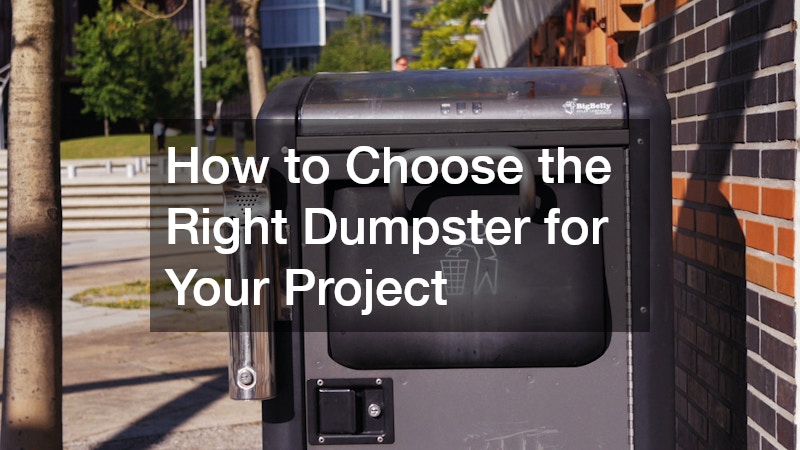
When you're embarking on a large project, whether it’s a home renovation, landscaping overhaul, or a significant decluttering effort, one vital aspect that requires careful consideration is waste management. Often overlooked, the decision to rent a dumpster can influence not just the efficiency of your project but also the disposal of materials. Choosing the right dumpster ensures that your project runs smoothly and keeps your work area safe and organized.
Video Source
This article delves into the essential factors to consider when selecting a dumpster, ensuring that you make an informed choice suited to your specific needs.
Before selecting a dumpster, it’s crucial to understand the types of waste you will be disposing of. Different materials can require different disposal methods, and not all dumpsters are designed for all types of waste. For example, construction debris, such as drywall and wood, may need a separate dumpster from household waste or yard waste. Identifying your waste type will help you avoid any extra costs associated with improper disposal. Additionally, by knowing what kind of waste you have, you can ensure compliance with local disposal regulations.
Most dumpster rental companies will provide detailed information on the types of materials each bin can accommodate. Certain dumpsters may have weight limits, and certain restrictions apply to hazardous waste materials. For instance, many companies prohibit items like paint, chemicals, or electronic waste from being disposed of in their dumpsters. Always ask for clarity on these limitations before making a reservation. Understanding your waste types ensures you choose the right dumpster without risk of extra fees or legal issues.
Once you’ve determined the waste types, the next step is assessing the volume and size of the dumpster you need. Dumpsters typically range from 10 to 40 cubic yards, and choosing the right size is crucial to prevent overflowing or excessive downtime. To estimate the required size accurately, it's helpful to visualize the waste you will need to dispose of or take measurements of the space you're clearing out. For smaller projects, like a garage cleanout, a 10- to 15-yard dumpster might suffice, while larger remodels may call for a bigger capacity.
Consider the dimensions, as well; it's not just about cubic yard capacity. A dumpster that fits well into your designated location will make loading much easier. Access to the dumpster should also be convenient for you and for the rental service that will eventually pick it up. Additionally, renting a dumpster that is too small will result in increased trips to the landfill, while an oversized dumpster will be a waste of resources. Therefore, getting the size right is about balancing convenience and cost-effectiveness.
Choosing the right dumpster also involves asking the rental service the right questions. Knowing the logistics, policies, and cost structures of dumpster rental can significantly inform your decision-making process. For instance, inquire about any additional fees, such as delivery, pickup, or disposal fees, which could affect your budget. Understanding the terms and conditions will allow you to gauge if the offer aligns with your project needs without hidden surprises down the line.
You should also ask about rental periods. Different companies have varying policies on how long you can keep the dumpster, which may run from a few days to weeks. Understanding the rental options available can help you better plan your project timeline and avoid late fees. Additionally, check if there are options for extending your rental in case your project takes longer than expected. Getting informed will help ensure clarity without misunderstandings during a project that is, by nature, chaotic.
Choosing the right dumpster for your project requires careful consideration of waste types, volume, and appropriate questions to ask rental services. Start by identifying the materials you'll be disposing of, as this lays the groundwork for your dumpster selection. Subsequently, consider the size based on your estimated volume and specific site accessibility. Finally, ensure to communicate openly with your dumpster service about any uncertainties to avoid complications.
By taking the time to calculate your project’s needs carefully, you empower yourself to choose a dumpster that meets your requirements precisely. Getting this right simplifies your waste disposal, making your project more efficient and manageable. With informed decisions and clear communication, you set the stage for a successful undertaking, minimizing stress and maximizing results.
